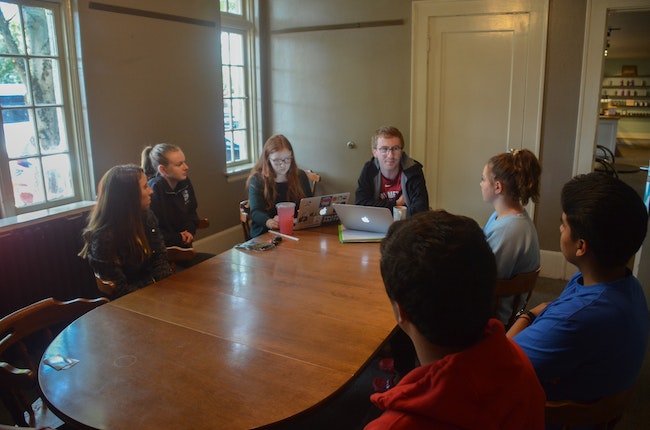 Eric Martz, center, and other board members of Live to Tell discuss suicide prevention during a board meeting on Sept. 26, 2019 (Rachel Alexander/Salem Reporter)
Eric Martz, center, and other board members of Live to Tell discuss suicide prevention during a board meeting on Sept. 26, 2019 (Rachel Alexander/Salem Reporter)
Eric Martz sat quietly in the third row of a school board meeting with two classmates from South Salem High School, listening to ideas on how to prevent teen suicide.
Martz thought many of the efforts sounded good: training all district staff on how to talk to and get help for suicidal students or having a district suicide prevention coordinator who helps schools teach students about suicide prevention.
The problem? As a student, most of what the 16 adults were discussing that evening was news to him.
“They’re not really seen by the people they’re trying to reach,” Martz said of existing suicide prevention efforts. “It’s really important that students are not just a part of the conversation but are leading the conversation on suicide prevention.”
[ Help build Salem Reporter and local news – SUBSCRIBE ]
The issue has gotten more attention in Salem since the suicides of two Sprague High School students last fall.
Now, Martz has started a nonprofit organization, Live to Tell, to give students better resources to help each other and sit at the table with adults when they’re crafting policies aimed at helping teens.
It’s a personal topic for him.
He said he has struggled with depression in high school, especially before coming out as gay, so he knows what it’s like to feel alone. That experience led him to volunteer for YouthLine, a Portland crisis hotline for teens staffed by peers who can text, chat or talk over the phone.
When he’s talking with other teens, he often asks them about adults in their life they could talk to.
“The answer, nine out of 10 times, is there’s nothing I can do at school,” he said. Some don’t like school counselors, can’t get an appointment or don’t feel they have access to a trusted adult. Most often, they turn to friends.
“I think there’s a big disconnect between staff and students around this issue,” Martz said.
At a meeting of the still-growing Live to Tell board last week, Martz laid out his vision to students from West, Sprague, North and South Salem high schools and asked how they felt about suicide prevention efforts at school.
Many reported the same concerns he had: students don’t feel they can talk to counselors or other adults, don’t realize what resources are there for them or don’t know how to take steps such as make an appointment. Some said their schools had recently switched counselors or re-assigned students to new ones, adding to the problem.
Even at Sprague, where suicide became a regular topic of conversation last year, junior Clara Mundal said she feels the issue isn’t discussed openly this year, except perhaps among the friends of the two boys who died.
“People just don’t think it’s a problem unless it’s happening all the time,” she said.
She lost a friend to suicide several years ago and said that made her want to get involved in Live to Tell. Many adults want to help, she said, but struggle with how.
“They care a lot and they want to see change but they don’t know what to do,” Mundal said.
 Eric Martz, a South Salem High School senior, speaks during a Live to Tell board meeting at Ike Box on Sept. 26, 2019 (Rachel Alexander/Salem Reporter)
Eric Martz, a South Salem High School senior, speaks during a Live to Tell board meeting at Ike Box on Sept. 26, 2019 (Rachel Alexander/Salem Reporter)
Martz’s goals are twofold. First, he’s working with other students to create a peer support club at every local high school – and eventually middle school – where students can talk about mental health, get training and learn about prevention.
He’s received help from school board members, particularly Satya Chandragiri, who campaigned with a focus on mental health and suicide prevention.
South Salem had a club called Saxon Strong in the past, but it died off when the student running it graduated, Martz said. He’s resurrected it, and the group has already had an impact.
About 20 students showed up to the first meeting, said Ryan Marshall, lead counselor at South and the club’s advisor. Their first recommendation was to create a web-based way to schedule counseling appointments instead of the existing paper referral system, which requires students to walk into the office and fill out a request.
Marshall worked with other counselors to draw up a form and will run it by the group at its next meeting. He said it’s part of South’s culture to listen to feedback from students.
“It’s just so clear that their voice needs to be included,” he said.
West Salem senior Kevin Garcia got involved in Live to Tell because of his own challenges managing the stress of schoolwork and drama among his friends.
He’s been able to talk to his mother and get help focusing on his goals without being overwhelmed, but he said many friends don’t have an adult in their lives they feel comfortable opening up with. Mental health problems are rarely discussed at West, he said.
“You kind of don’t really hear that around here,” he said.
La’Maya Thielen, a student at North, said she’s working to create a peer support center where students can talk to trained classmates if they don’t feel comfortable talking to an adult.
Martz is working to find students at McNary, McKay and Roberts high schools to join in.
He also wants Live to Tell to serve as a go-to group for adults seeking to make policy about suicide prevention, whether within the district or at the state level.
Salem-Keizer has a student equity committee which meets regularly with Superintendent Christy Perry and suggests how the district can better serve students of color, students with disabilities and other underserved groups. He’d like Live to Tell to do the same for mental health.
To help, he asked classmate Eddy Binford-Ross to serve as the board’s secretary. They’d never spoken before, but Martz was aware of her work leading Salem’s climate strike and interning at the Oregon Capitol and wanted her help teaching students how to navigate the political system.
The issue is important to her too: Binford-Ross said she knows several people who have attempted suicide.
Binford-Ross said students often want to weigh in on decisions being made, but don’t understand the process of testifying before legislators or feel intimidated by going to a school board meeting alone and speaking before a roomful of adults.
“People don’t feel empowered, even if they know you can do it,” she said.
Martz’s efforts have earned the support of Marshall and Principal Lara Tiffin, who said she tries to create a culture at South that values student voices and responds to their concerns.
Last year, the school organized an assembly to talk about mental health after a request from students, she said. In a gym full of 2,000 students, she said it was so quiet “you could hear a pin drop.”
Salem-Keizer is requiring all school employees to train in suicide prevention, focusing on explicitly asking a struggling student whether they’re considering suicide, then directing them toward help.
Schools must have staff trained by the start of school next fall, but Tiffin had South employees do so before school started.
Several students said teens may feel comfortable talking about suicide prevention as an abstract issue, but are still reluctant to discuss their own feelings or struggles.
“I think a lot of people are uncomfortable with the way they feel. They feel they shouldn’t be depressed or they should have control over that when you can’t control the way you feel,” Mundal said. “We need to make people feel okay with not being okay. People aren’t going to talk about it if they feel like they can’t without being judged.”
Reporter Rachel Alexander: [email protected] or 503-575-1241.

Rachel Alexander is Salem Reporter’s managing editor. She joined Salem Reporter when it was founded in 2018 and covers city news, education, nonprofits and a little bit of everything else. She’s been a journalist in Oregon and Washington for a decade. Outside of work, she’s a skater and board member with Salem’s Cherry City Roller Derby and can often be found with her nose buried in a book.









